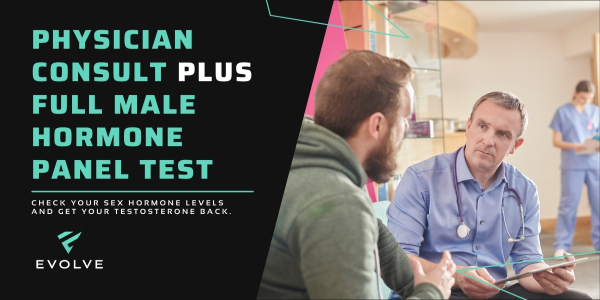
HRT Treatment Plans for Men
Restore optimal testosterone levels
Hormone Imbalance in Men
Men with low testosterone often report that they simply do not feel right. They may feel run down or tired, and have muscle loss and decreased interest in sex or even inability to perform.
Male Symptoms of Hormone Imbalance
- Depression
- Fatigue
- Loss of concentration or memory
- Muscle Loss
- Weight Gain
- Hot Flashes
- Erectile Dysfunction
- Lower sex drive
- Hair loss
- Urinary problems
- Insomnia
- Irritability
- Night sweats
- Adrenal fatigue
Understanding Male Hormones
Testosterone in Men
Testosterone is the life source for the male body which is filled with testosterone receptors. If testosterone levels dip, these receptors won’t receive enough testosterone and results in Low Testosterone symptoms. Since many healthcare professionals consider men from age 18-70 to have the same range of what is considered “normal” testosterone, many men begin seeing deficiencies as early as their 30’s but do not have access to therapy through their primary care physician. HRT Wellness doctors don’t think in terms of normal levels—we think in terms of optimal levels. Optimal is where a man feels and functions at his best, without unpleasant symptoms.
Estrogen in Men
Small amounts of estrogen improve cardiovascular health, enhance brain function, and prevent osteoporosis. But many men have too much which can result in symptoms like fatigue, low sex drive, and belly fat as well as an increased risk for prostate cancer.
Elevated estrogen usually occurs as testosterone declines, because as testosterone declines, most men will accumulate fat–primarily belly fat. Fat contains an enzyme called aromatase, and aromatase converts testosterone to estrogen. In other words, as men age, their bodies often exchange testosterone for estrogen at an increased rate. Estrogen, in turn, causes belly fat. It becomes a vicious circle. This is why raising testosterone levels without controlling estrogen is counterproductive, and why losing weight if your hormones are out of whack will be nearly impossible.
Unlike testosterone, we don’t think of estrogen as being a hormone that needs to be replaced. Instead, it needs to be controlled. Estrogen in men should be kept within a tight window. If it’s too high or too low, there can be symptoms.
Our doctors control estrogen as part of our treatment programs by placing men on an estrogen blocker as needed. Estrogen blockers effectively suppress estrogen conversion at the same time as we’re increasing testosterone levels, thereby eliminating existing symptoms, and preventing future ones.
Benefits of Hormone Therapy for Men
Hormone Therapy and Estrogen Blockers can help men look better, feel better, happier and more satisfied. Male patients can benefit by reclaiming focus, improving energy, and increasing enthusiasm for time spent with family, work, and during physical intimacy. Proper hormone levels can even protect against cardiovascular disease, elevated blood pressure, certain forms of cancer, diabetes, osteoporosis and many other diseases. You may notice many additional benefits including:
- Improved Muscle Tone and Definition
- Enhanced Sexual Function
- Decreased Belly Fat
- Improved Sleep
- Amplified Energy and Motivation
- Elevated Mood
- Elevated Physical Ability
- Higher Quality of Life
- Sharpened Memory and Focus
How to Find the HRT Plan That’s Right for You
Every man has his own unique set of circumstances and must be treated as an individual. HRT physicians use a combination of comprehensive diagnostic lab work, feedback from the patient, and medical history and symptomology to determine the patient’s individual Testosterone Therapy regimen. With Testosterone Therapy, many of our patients can see improvement in 1 to 2 weeks and feel like a new man in 3 to 6 weeks.
It is important to note that not every adult male will be a candidate for Testosterone Replacement Therapy. This is why it’s very important that you speak with a doctor who specializes in treating Low Testosterone in adult men.
FAQs
What is Andropause?
While women experience Menopause, all men starting around the age of 30, will experience a male form of Menopause, also known as Andropause. Testosterone levels deplete overtime, and inevitably men start experiencing the symptoms of aging.
What are the Symptoms of Andropause or Male Testosterone Depletion?
- Depression
- Fatigue
- Muscle Loss
- Weight Gain
- Gynecomastia
- Hot Flashes
- Erectile Dysfunction
- Lower Sex Drive
- Hair Loss
- Urinary Problems
- Insomnia
- Irritability
- Night Sweats
- Hypogonadism
- Adrenal Fatigue
- Thyroid Health
What are the risks of Testosterone Replacement in Men?
Some patients could experience side effects and many of them are linked to dosage which may need changing over time. It is always recommended that you communicate side effects to your physician to be promptly addressed. These effects may include:
- Increase in red blood cells – This can be beneficial patients with anemia (low blood counts). However, it can cause blood vessel blockage and lead to a heart attack or stroke.
- Irritability – Some men and women have reported increased aggressiveness or irritability at the start of testosterone hormone therapy. These issues are generally resolved as levels become balanced.
- Prostate effects – Prostate issues can arise with higher levels of Testosterone. If you have an enlarged prostate, referred to as benign prostatic hyperplasia (BPH), testosterone may worsen your symptoms, particularly if you are more than 50 years of age. If you have a history of prostate cancer, you cannot receive testosterone therapy.
- Infertility – This is common in young men when sperm production is reduced but usually reversible after stopping testosterone therapy.
- Sleep apnea – This is a condition that disrupts breathing during sleep. Although uncommon, it is a reported side effect.
- Fluid retention – Although uncommon, you must use caution if you have a history of heart failure or kidney disease.
- Other – Acne, oily skin, increased body hair and flushing have also been reported. Occasionally, hormone therapy patients will complain of itching or redness at the injection or insertion site, bit these symptoms diminish as the body adjusts to treatment.
What are normal levels of Testosterone?
Testosterone levels (also known as T levels) between 350ng/dL and 1000ng/dL are considered normal, however you may still fall within this range and still be considered to have low T. The brain, pituitary gland, hypothalamus and the testicles work together to keep testosterone in the normal range. If testosterone levels are below normal for your body, the brain signals the testicles to produce more. When testosterone levels are adequate, the brain signals the testicles to produce less. If one of these areas is not functioning properly it is likely to reduce testosterone production.
Is Testosterone therapy effective at treating infertility?
No. It can have the opposite effect. Introducing additional testosterone can reduce the amount of sperm the body produces. Other treatments can help the body to produce more sperm.
Is there a correlation between testosterone levels and the amount of body hair?
Body hair is mostly tied to genetics and hereditary backgrounds. Men with Low T can experience a reduction in hair but testosterone therapy does not stimulate hair growth in areas you previously did not have hair.
HRT for Men is Available in the Following States:
- Alabama
- Alaska
- Arizona
- Arkansas
- California
- Colorado
- Connecticut
- Delaware
- Florida
- Georgia
- Hawaii
- Idaho
- Illinois
- Indiana
- Iowa
- Kansas
- Kentucky
- Louisiana
- Maine
- Maryland
- Massachusetts
- Michigan
- Minnesota
- Mississippi
- Missouri
- Montana
- Nebraska
- Nevada
- New Hampshire
- New Jersey
- New Mexico
- New York
- North Carolina
- North Dakota
- Ohio
- Oklahoma
- Oregon
- Pennsylvania
- Rhode Island
- South Carolina
- South Dakota
- Tennessee
- Texas
- Utah
- Vermont
- Virginia
- Washington
- Washington DC
- West Virginia
- Wisconsin
- Wyoming
